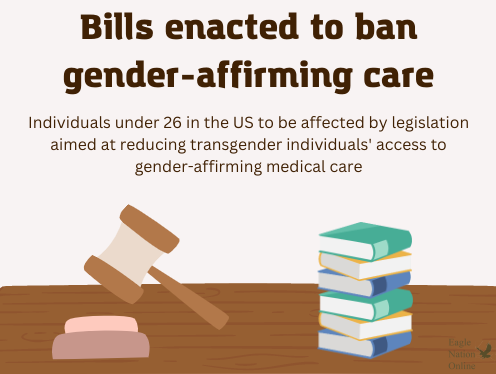Bills in Texas, other states to restrict access to gender-affirming healthcare
Legislation seeks to limit hormones, surgeries for transgender individuals under 26

Legislators have introduced and enacted bills in Texas and around the nation centering around LGBT+ individuals that would limit or ban gender affirming care. The latest Texas bills followed a directive last year from Texas Gov. Greg Abbott that compelled child welfare agents to open abuse investigations into parents who allowed their children to receive gender-affirming care. “Gender-affirming care has enabled me to have dreams, hopes, ambitions and goals,” senior Cole Lee said. “By allowing me to transition, my parents saved my life.”
As South Dakota signed into law House Bill 1080 on Feb. 13, which prohibits most forms of gender-affirming care for minors, Texas and other states are in the process of putting similar laws into action that affect students who want to make their own decisions regarding gender-affirming care.
Three of the 35 Texas bills proposed center around LGBT+ individuals and would classify providing gender-affirming care to minors as a form of child abuse and punishable as a second degree felony. Such bills follow a directive last year from Republican Gov. Greg Abbott that asked child welfare agents to open abuse investigations into parents who allowed their children to receive gender-affirming care.
“The laws that seek to prohibit gender-affirming care are not only ridiculous, but dangerous,” Prosper High School senior Cole Lee said. “Before transitioning, I was in such an incredibly dark place, one so profound I didn’t think I could ever find my way out.”
In January, Mississippi’s House passed a bill that made it illegal to “knowingly provide gender-transition procedures” to any person under the age of 18. Physicians and other medical professionals found to have violated the ban would have their license to practice health care in the state revoked.
An NPR analysis found that in the last three years, at least 306 bills regarding transgender people were introduced by state lawmakers, more than in any previous period, with 86% of the legislation regarding transgender youth.
Kansas, New Hampshire, South Carolina and Virginia have proposed bills that would ban gender-affirming care to anyone under 21, with South Carolina and Oklahoma considering a bill that said a “physician or other healthcare professional shall not provide gender-transition procedures” to anyone under the age of 26. According to the description of the legislation from the state houses of both states, medical professionals convicted of violating the law would be guilty of a felony, with a conviction in Oklahoma carrying a sentence of up to five years in prison. The bills also prohibit public funds from being used “directly or indirectly” at organizations that provide such care.
Gender-affirming care is defined by the World Health Organization as “social, psychological, behavioral or medical interventions designed to support and affirm an individual’s gender identity.”
Among the bills proposed in 2023 was one in Mississippi introduced in the 2023 regular session that would criminalize people who provided or aided in the provision of gender-affirming care for individuals under the age of 21, with violators of the ban facing “the felony crime of ‘gender disfigurement.’” Violators would face fines of $10,000 or higher and be sentenced to up to five years in prison.
In a press release letter to the Texas Department of Family and Protective Services released Feb. 22, 2022, Abbott detailed the procedures to be carried out following the new legislation criminalizing gender-affirming care.
“A number of so-called ‘sex change’ procedures constitute child abuse under existing Texas law,” Abbott said. “Because the Texas Department of Family and Protective Services is responsible for protecting children from abuse, I hereby direct your agency to conduct a prompt and thorough investigation of any reported instances of these abusive procedures in the state of Texas. Texas law imposes reporting requirements upon all licensed professionals who have direct contact with children who may be subject to such abuse, including doctors, nurses, and teachers, and provides criminal penalties for failure to report such child abuse.”
Abbott ordered the DFPS to investigate any facilities and families that they suspect provide gender-affirming care and consider charges of child abuse.
“Texas law also imposes a duty on DFPS to investigate the parents of a child who is subjected to these abusive gender-transitioning procedures, and on other state agencies to investigate licensed facilities where such procedures may occur,” Abbott said. “To protect Texas children from abuse, DFPS and all other state agencies must follow the law as explained in OAG.”
In the Trevor Project’s National Survey on LGBT+ Youth Mental Health for 2021, 52% of LGBT+ youth seriously considered attempting suicide in 2021. Students at Prosper High School spoke about struggles with mental health related to transitioning and gender identity.
Lee explained his belief in the importance of safe access to gender-affirming care, especially for minors.
“Gender-affirming care has enabled me to have dreams, hopes, ambitions and goals,” Lee said. “By allowing me to transition, my parents saved my life. I shouldn’t have to worry if my parents will go to jail for saving my life, but it’s a real, traumatizing fear I and countless other children have faced because of these laws.”
As of Jan. 28, gender-affirming care is banned for anyone under the age of 18 in Utah. This bill, approved 58-14 by House Republicans, prohibits medical providers from offering gender-affirming surgical procedures to anyone under 18, and bans gender-affirming hormonal treatment for any new patients under 18.
Senior Dason Stieg said he believes the bill is needed.
“It’s probably best to wait until you’re 18,” Stieg said. “You’re a little more mature and will probably have a better understanding of yourself at that age.”
College sophomore Mason Gollotto spoke about the effect that gender-affirming care, and in particular top surgery, has had on their life.
“I’m a sophomore in college, but I started my transition experience when I was 17 and got top surgery,” Gollotto said. “Top surgery was necessary for me and genuinely saved my life, so hearing these laws being passed stopping transgender people from transitioning is upsetting. While I understand transitioning is a big decision, that’s why transgender people work with doctors to find the best option for them. There’s so many benefits to transitioning, from helping with depression to literally stopping people from committing suicide.”
Collin College freshman Luna Ramirez said the benefits and consequences should be considered in each case.
“The best thing is for parents to (watch out for) signs that their child is transgender. When it comes to adults, I don’t see how making a gender-affirming care ban up to 26-year-olds is for anyone’s benefit. Because, if someone is transgender, it (isn’t) a phase and withholding the ability for a transgender individual to (receive gender-affirming care) will have severe consequences.”
Ramirez said the legislation surrounding the transgender population and medical care is a complex one, with no simple answer when it comes to young children and potential detransitioners, individuals who undergo a medical transition and later regret their decision.
“I understand why the conversation is needed when it comes to trans kids, because it is a high-risk, high-reward situation,” Ramirez said. “On one hand, it can be an amazing thing for a trans child to start hormone blockers under supervision of a doctor – and when they are ready to start HRT. But on the other hand, I think that it can have very harmful affects on someone who is not transgender, depending on if they started HRT or puberty blockers.”
Your donation will support the student journalists of Prosper High School. Your contribution will allow us to purchase equipment and cover our annual website hosting costs.

Honors, Experience and Awards:
5 Best of Sno publications.
5th place in Copy Editing, district UIL meet 2021
Honorable mention- Podcast interview, 2021 TAJE Fall Fiesta
UIL Journalist 2020-2021, 2021-2022
Quill and Scroll Society member 2021-2022
1st place in Copy Editing for CENTEX UIL meet 2021-2022
3rd place in Copy Editing for Aubrey UIL meet 2022
2nd place in Copy Editing for NorTex UIL District meet 2022
National Silver award for poetry from the Scholastic Art & Writing organization
National Recognition Award from College Board
AP Scholar with Distinction Award
2 Best in Texas News & Broadcast Awards, 2022: Personal Opinion Column- Honorable Mention, News Story- Honorable Mention
President of the Classic Book Club, 2020-onwards
Member of the National Spanish Honors Society (NSHS)
PHS Award for Academic Excellence in Newspaper II, 2022
Dean’s Scholarship for Cornell University Pre -College Program
Sibley Scholarship for Brown University Pre -College Program
CIEE Global Navigator Scholarship











